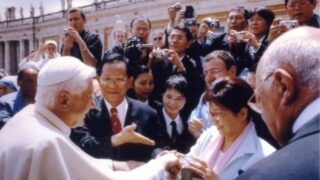Introduction to the hybrid seminar “The Stolen Youth of Tai Ji Men,” co-organized by CESNUR and Human Rights Without Frontiers on August 8, 2022, in Walnut, California, in sight of the UN International Youth Day of August 12.
by Massimo Introvigne


Conventionally, Generation Z includes those young women and men born after 1996. Those born between 1981 and 1996 are called Millennials. There are dozens of studies, articles, and books about Generation Z and religion, and a widespread claim that Z is the first non-religious generation in the United States and elsewhere. For example, in March 2022, the Survey Center on American Life of the American Enterprise Institute found that 34% of Generation Z Americans were “nones,” a term indicating those not affiliated with any religion, and 18% identified themselves as atheists or agnostics. Both numbers were significantly higher than those concerning the Millennials. The study also affirmed that there are several factors supporting the prediction that, contrary to what happened with previous generations, most of the Zs would never come back to religion.
In Italy in 2016 sociologist Franco Garelli published a book called “Little Atheists Grow Up,” claiming that 30% of the late Millennials and Generation Z he surveyed were atheists or agnostics. In 2018, a study by St Mary’s University in London prepared for the Synod of Catholic Bishops found that in the Czech Republic 91% of the Zs were “nones,” 75% in Sweden, 60% in France (although only 25% in Lithuania).


The surveys ask different questions to slightly different age cohorts in different countries, and cannot be easily compared. What sociologists have offered are tentative conclusions, which I would classify in four groups.
First, different surveys agree that the number of “nones” and even of atheists-agnostics is growing in most Western countries, although significant national differences exist. Generation Z is less religious than the previous generation, the Millennials.
Second, most sociologists expect that the familiar phenomenon, reassuring for religionists, of young people who abandon religion but come back when they marry, have children, and get old, will not repeat itself this time. Already for the Millennials the fact that those who were irreligious in their young age largely stayed irreligious when they grew up and married was perceived as the most significant factor of religious change. Most predictions assume that the percentage of those who will stay irreligious when growing up will become even higher with Generation Z. Of course, predictions are always uncertain, and there are important differences between countries.
Third, one should not confuse the growth of young people not affiliated with any organized religion with the growth of atheists. When the number of “nones” grows, in most cases the number of atheists also grows, but there is no automatic correlation. The number of atheists remains significantly smaller than the number of “nones.” Millions of young people throughout the world who do not like organized religion still affirm that they believe in the existence of God, although not necessarily the Christian God or a personal God. They may leave traditional religions to embrace new spiritual paths rather than atheism.


Fourth, and this is a point emphasized in the book by Garelli, since being religious is no longer a matter of course, in addition to the “nones” there is another group whose numbers are growing. It includes those young people who are firmly committed to a religious or spiritual path, and regard themselves not only as practitioners but as activists (12% in Italy, according to Garelli).
The few studies about Taiwan seem to confirm it is similar to other affluent and democratic societies that have traditionally valued spirituality, including the United States. Although youth in a significant percentage regard institutional religion with skepticism, a large majority maintains spiritual beliefs, and atheists clearly remain a minority.
Sociologists know that such contexts are ideal for the emergence of forms of spirituality alternative to the mainline. The Taiwanese context explains why so many young people embraced, and continue to embrace, vibrant and persuasive spiritual organizations, including Tai Ji Men. Since they do not simply conform to social patterns (although many have parents who are themselves Tai Ji Men dizi, “disciples”), the phenomenon of the committed minority described by Garelli is also at work. A minority the young dizi may be, but they are part of a very committed and active group. Indeed, one may argue that the commitment of the young dizi is exceptional. Many have been to faraway countries to promote Tai Ji Men’s culture of peace, love, and conscience, traveling at their own expenses.


It may seem an exemplary story, but it comes with a price. In each society, there are forces that dislike what does not conform to the usual schemes, has something new to say—even if the new message is rooted in a very old tradition—and cannot be easily controlled. Enthusiastic youth are not always applauded; they may often be harassed and even persecuted. This is what happened to Tai Ji Men. The rogue bureaucrats were the executioners. The machinery that did not tolerate the freedom, independence, and creativity of Tai Ji Men had deeper roots, which indicate systemic problems in the young Taiwanese democracy.









